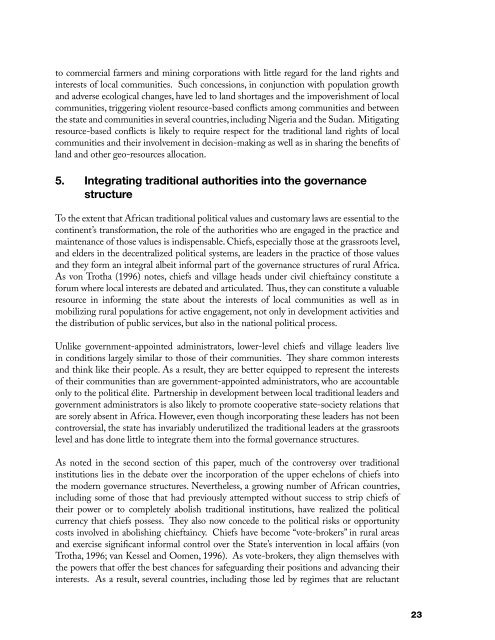Relevance of - United Nations Economic Commission for Africa
Relevance of - United Nations Economic Commission for Africa
Relevance of - United Nations Economic Commission for Africa
Create successful ePaper yourself
Turn your PDF publications into a flip-book with our unique Google optimized e-Paper software.
to commercial farmers and mining corporations with little regard <strong>for</strong> the land rights and<br />
interests <strong>of</strong> local communities. Such concessions, in conjunction with population growth<br />
and adverse ecological changes, have led to land shortages and the impoverishment <strong>of</strong> local<br />
communities, triggering violent resource-based conflicts among communities and between<br />
the state and communities in several countries, including Nigeria and the Sudan. Mitigating<br />
resource-based conflicts is likely to require respect <strong>for</strong> the traditional land rights <strong>of</strong> local<br />
communities and their involvement in decision-making as well as in sharing the benefits <strong>of</strong><br />
land and other geo-resources allocation.<br />
5. Integrating traditional authorities into the governance<br />
structure<br />
To the extent that <strong>Africa</strong>n traditional political values and customary laws are essential to the<br />
continent’s trans<strong>for</strong>mation, the role <strong>of</strong> the authorities who are engaged in the practice and<br />
maintenance <strong>of</strong> those values is indispensable. Chiefs, especially those at the grassroots level,<br />
and elders in the decentralized political systems, are leaders in the practice <strong>of</strong> those values<br />
and they <strong>for</strong>m an integral albeit in<strong>for</strong>mal part <strong>of</strong> the governance structures <strong>of</strong> rural <strong>Africa</strong>.<br />
As von Trotha (1996) notes, chiefs and village heads under civil chieftaincy constitute a<br />
<strong>for</strong>um where local interests are debated and articulated. Thus, they can constitute a valuable<br />
resource in in<strong>for</strong>ming the state about the interests <strong>of</strong> local communities as well as in<br />
mobilizing rural populations <strong>for</strong> active engagement, not only in development activities and<br />
the distribution <strong>of</strong> public services, but also in the national political process.<br />
Unlike government-appointed administrators, lower-level chiefs and village leaders live<br />
in conditions largely similar to those <strong>of</strong> their communities. They share common interests<br />
and think like their people. As a result, they are better equipped to represent the interests<br />
<strong>of</strong> their communities than are government-appointed administrators, who are accountable<br />
only to the political élite. Partnership in development between local traditional leaders and<br />
government administrators is also likely to promote cooperative state-society relations that<br />
are sorely absent in <strong>Africa</strong>. However, even though incorporating these leaders has not been<br />
controversial, the state has invariably underutilized the traditional leaders at the grassroots<br />
level and has done little to integrate them into the <strong>for</strong>mal governance structures.<br />
As noted in the second section <strong>of</strong> this paper, much <strong>of</strong> the controversy over traditional<br />
institutions lies in the debate over the incorporation <strong>of</strong> the upper echelons <strong>of</strong> chiefs into<br />
the modern governance structures. Nevertheless, a growing number <strong>of</strong> <strong>Africa</strong>n countries,<br />
including some <strong>of</strong> those that had previously attempted without success to strip chiefs <strong>of</strong><br />
their power or to completely abolish traditional institutions, have realized the political<br />
currency that chiefs possess. They also now concede to the political risks or opportunity<br />
costs involved in abolishing chieftaincy. Chiefs have become “vote-brokers” in rural areas<br />
and exercise significant in<strong>for</strong>mal control over the State’s intervention in local affairs (von<br />
Trotha, 1996; van Kessel and Oomen, 1996). As vote-brokers, they align themselves with<br />
the powers that <strong>of</strong>fer the best chances <strong>for</strong> safeguarding their positions and advancing their<br />
interests. As a result, several countries, including those led by regimes that are reluctant<br />
23
















